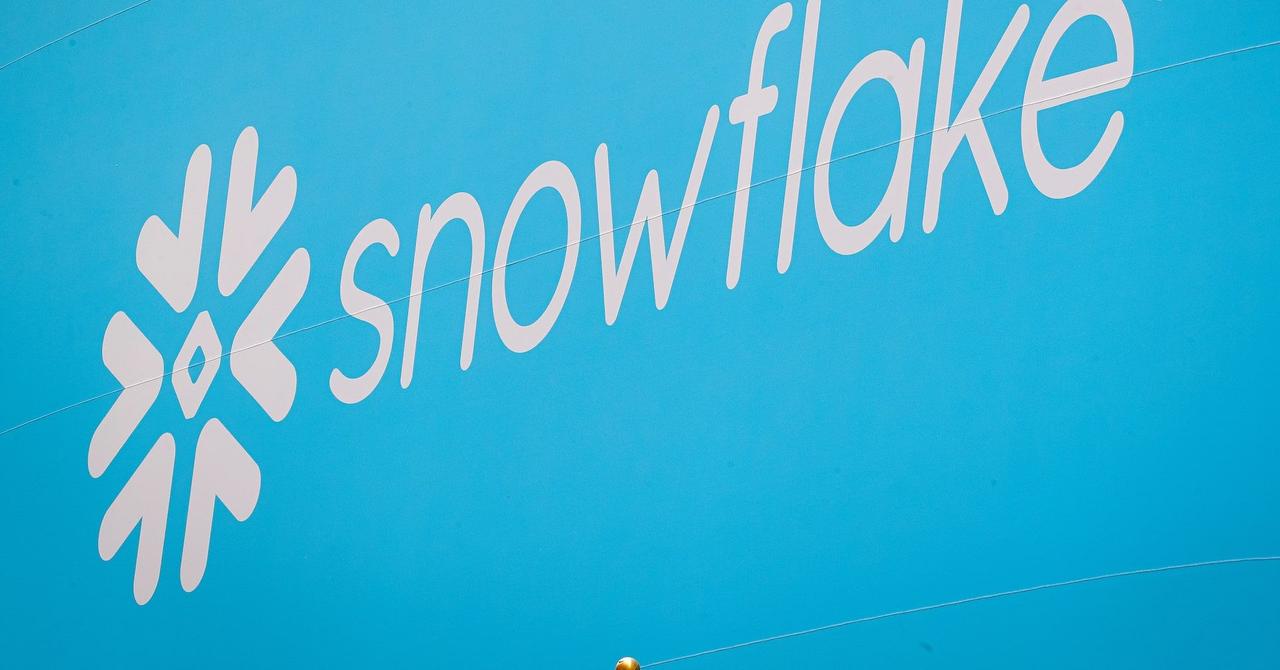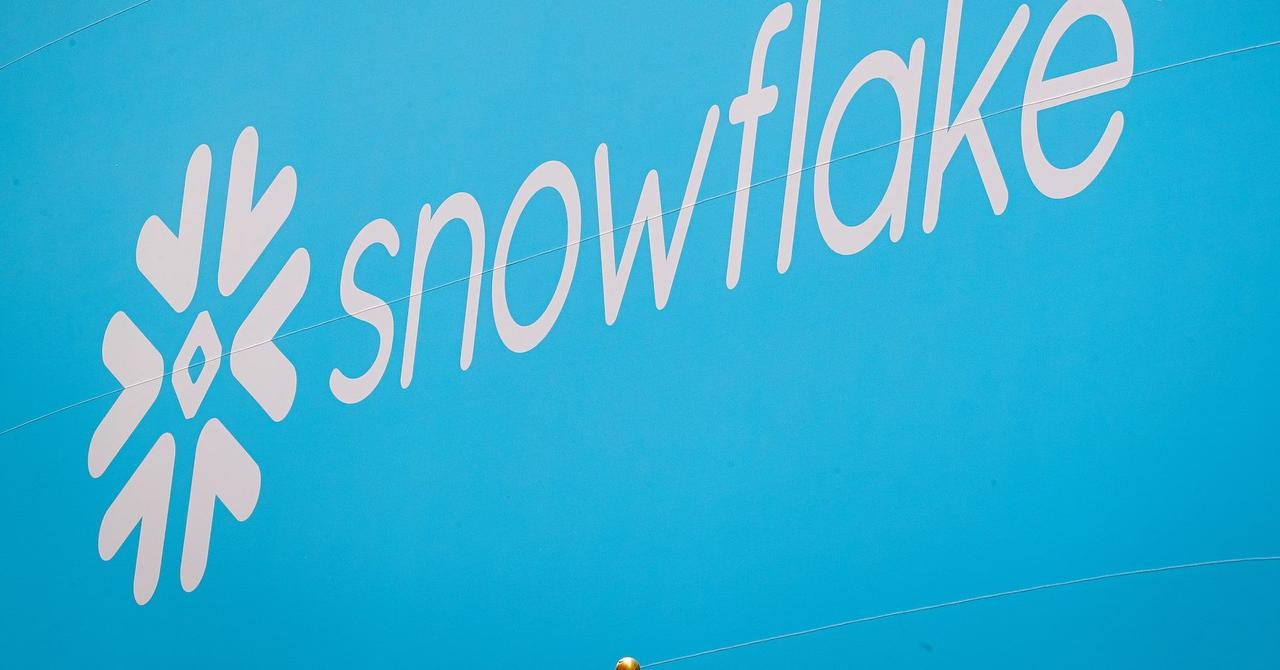Snowflake Stock: Analyzing the Recent Dip and Future Prospects
2 Sources
2 Sources
[1]
Is It Time to Buy the Dip in Snowflake Stock? | The Motley Fool
This has has been an excellent year for many tech stocks. In fact, the tech sector of the S&P 500 is up over 30% this year. But that doesn't mean there haven't been a few laggards. Snowflake (SNOW -0.81%) has been one of those tech companies that dramatically underperformed this year, with the stock plummeting over 30%. But this could be an opportune time to buy Snowflake, as the lofty expectations that are built into many of its tech brethren don't exist with Snowflake. Snowflake is a software company that is focused on what it calls the data cloud. Essentially, if you have a product that generates data, Snowflake is an excellent partner. Its products can help users efficiently store information, even if it's unstructured. It also has tools to utilize that data and scrape information to determine trends that can help steer a business direction. It can also be used to feed real-time information to various platforms to ensure that a business is using the most up-to-date information possible. In an age of artificial intelligence (AI) that requires vast amounts of data to train models effectively, Snowflake is a vital software platform. This translated into strong growth for Snowflake, as its product revenue rose 34% year over year to $790 million in the first quarter of fiscal year 2025 (ending April 30). It's also expected to grow product revenue around 26% to 27% to $808 million in the second quarter. Those two figures seem impressive in a vacuum, but the problem is they mark a significant growth deceleration that the market hates. In the market's mind, Snowflake's revenue should accelerate due to companies wanting to collect data for various AI projects. However, many companies already subscribed to Snowflake's product or one of its competitors, so Snowflake's easy growth is likely over. Now comes the much harder growth, where it must try to sway customers to onboard to its platform over a competitor's, which can be expensive. When companies reach this stage, they are usually profitable. Unfortunately, Snowflake is a long way away from achieving this status. In Q1, Snowflake's gross profit totaled $556 million, meaning it has that much to work with after the expense of actually producing the software was factored in. However, Snowflake spent $905 million in various areas, making the stock massively unprofitable. This figure, known as operating profit (or operating loss in this case), is a key metric to determine how close a business is to breaking even. Snowflake isn't even close and isn't making much effort to reach that level. However, a key difference is that operating margin includes expenses like stock-based compensation. It's technically a noncash expense because Snowflake can create shares out of thin air. This is why Snowflake is free-cash-flow-positive and part of how it turned an astounding 40% of its revenue into cash in Q1 (along with a sizable accounts receivable line item). So, Snowflake could technically continue in this state forever because it isn't running out of cash. However, that would dilute shareholders and cause poor long-term returns. This isn't a big deal if Snowflake is growing at a rapid pace, but with its growth declining and profits not improving, investors have started to head for the exits. This is part of the reason why Snowflake can be purchased at its lowest price-to-sales (P/S) ratio ever as a public company. So, what should investors do? If you're on the sidelines, I'd say buy a small portion to see how business improves. Snowflake has a new CEO at the helm, so the practice of high unprofitability and large stock-based compensation could be going away, although there hasn't been information on if this is happening. If that's the case, the outlook on the stock could improve and send it rocketing higher. If you're already a shareholder, you're likely already down heavily. It would be wise to stick around for a few more quarters to see how the new CEO changes the business, as Snowflake's business could become a sleeping giant if it becomes profitable. As a Snowflake shareholder, I'm willing to give the new CEO around a year to get the company moving in the right direction. If he doesn't, I may follow suit and sell, as the clock is ticking for Snowflake to turn a profit.
[2]
Can Snowflake Stock Bounce Back After Falling 30% This Year? | The Motley Fool
Artificial intelligence (AI) stocks have been doing well for the most part this year, but one exception is Snowflake (SNOW -0.81%). The data-storage company should be benefiting from a surge in AI-related spending, but instead, its share price is down 30% this year. What's wrong with Snowflake, and can now be a good time to invest in the company? Or could things get even worse for the stock? Snowflake's struggles this year began in February, when investors learned that the company's CEO, Frank Slootman, was retiring. The news came as a surprise, and it led to a sharp sell-off. And the stock hasn't been able to recover since then. Even though new CEO Sridhar Ramaswamy comes with a strong background in tech, including working at Alphabet and being in charge of Google's ad business, investors have remained skeptical of the company's future without Slootman. Changes in leadership can unfortunately create uncertainty for a company, even though it may stay on largely the same trajectory and possess the same growth opportunities as it did before. Another problem for Snowflake is that the company's growth rate has been slowing down sharply in recent quarters. It hasn't been getting a big boost due to AI-related spending, at least not yet. While its growth rate remains high at more than 30%, investors may have been expecting more of an uptick in revenue by now. Ramaswamy said that during the first quarter (ended on April 30), Snowflake's AI products are available and they "are generating strong customer interest." But without quantifying how much that interest means in terms of real dollars, investors appear to remain unimpressed. Further exacerbating these issues is that Snowflake's losses aren't improving. Last quarter, the company incurred an operating loss of $348.6 million, which was 28% higher than the $273.2 million loss it reported in the prior-year period. Growing the top line is important, but investors will expect that there is a path to profitability as well -- and that's not visible in Snowflake's financials right now. Earlier this year, Snowflake also disclosed a cyberattack that impacted multiple clients. And now, investors are learning that telecom company AT&T and its more than 240 million U.S. customers appear to be impacted due to that breach. The breach could have a lasting impact on Snowflake's reputation and hurt its ability to attract new customers, and it may result in a loss of existing ones. This is particularly troubling for a company such as Snowflake, where its high growth rate is a key reason growth investors buy the stock. Snowflake's stock has been nosediving and it's hard to tell how much longer this tailspin might continue. But I don't expect it'll recover this year, as its guidance is likely to take a hit given the recent data breach. If you're bullish on AI, the stock could still make for an underrated buy, but be warned, as it could be a bumpy ride ahead for the business. Companies generally recover from data breaches and while the bad news may seem overwhelming for the business right now, investors generally have short memories. For contrarian investors who are comfortable with some risk, Snowflake could be worth taking a chance on. But if you're a risk-averse investor, you may want to wait on the sidelines for now as things may get worse before they get better for Snowflake.
Share
Share
Copy Link
Snowflake's stock has experienced a significant 30% decline this year. This article examines the reasons behind the drop and evaluates whether it presents a buying opportunity for investors.

Snowflake's Stock Performance
Snowflake (NYSE: SNOW), a cloud-based data warehousing company, has seen its stock price plummet by 30% since the beginning of the year
1
. This significant drop has caught the attention of investors and market analysts alike, prompting discussions about whether this dip presents a buying opportunity or signals deeper issues within the company.Reasons Behind the Stock Decline
Several factors have contributed to Snowflake's stock decline:
-
Valuation concerns: Snowflake's high price-to-sales ratio of 20 has raised eyebrows among investors, especially in comparison to other high-growth tech stocks
1
. -
Macroeconomic pressures: The broader economic environment, including inflation and interest rate hikes, has negatively impacted growth stocks like Snowflake
2
. -
Slowing revenue growth: Snowflake's revenue growth rate has decelerated from triple-digit percentages to 70% year-over-year in the most recent quarter
2
.
Snowflake's Financial Performance
Despite the stock price decline, Snowflake's financial performance remains strong:
-
Revenue growth: The company still maintains a robust 70% year-over-year revenue growth rate
1
. -
Customer acquisition: Snowflake added 1,550 new customers in the past year, bringing its total to 8,550
1
. -
Net revenue retention rate: At 151%, this metric indicates that existing customers are spending more over time
2
.
Related Stories
Future Prospects and Challenges
Snowflake faces both opportunities and challenges in the coming years:
-
Market expansion: The company aims to expand its total addressable market to $248 billion by 2026 through new products and services
1
. -
Artificial Intelligence integration: Snowflake is leveraging AI to enhance its offerings, potentially opening up new revenue streams
2
. -
Competition: The company faces stiff competition from tech giants like Amazon, Microsoft, and Google in the cloud data warehousing space
1
.
Investor Considerations
For investors considering Snowflake stock:
-
Long-term potential: The company's strong growth metrics and expanding market opportunities suggest potential for long-term gains
2
. -
Valuation risks: The high price-to-sales ratio may deter value-oriented investors
1
. -
Market volatility: Tech stocks remain susceptible to market fluctuations and macroeconomic factors
2
.
As with any investment decision, potential investors should carefully weigh the risks and rewards, considering their individual financial goals and risk tolerance before making a decision on Snowflake stock.
References
Summarized by
Navi
Related Stories
Recent Highlights
1
ByteDance's Seedance 2.0 AI video generator triggers copyright infringement battle with Hollywood
Policy and Regulation

2
Demis Hassabis predicts AGI in 5-8 years, sees new golden era transforming medicine and science
Technology

3
Nvidia and Meta forge massive chip deal as computing power demands reshape AI infrastructure
Technology








